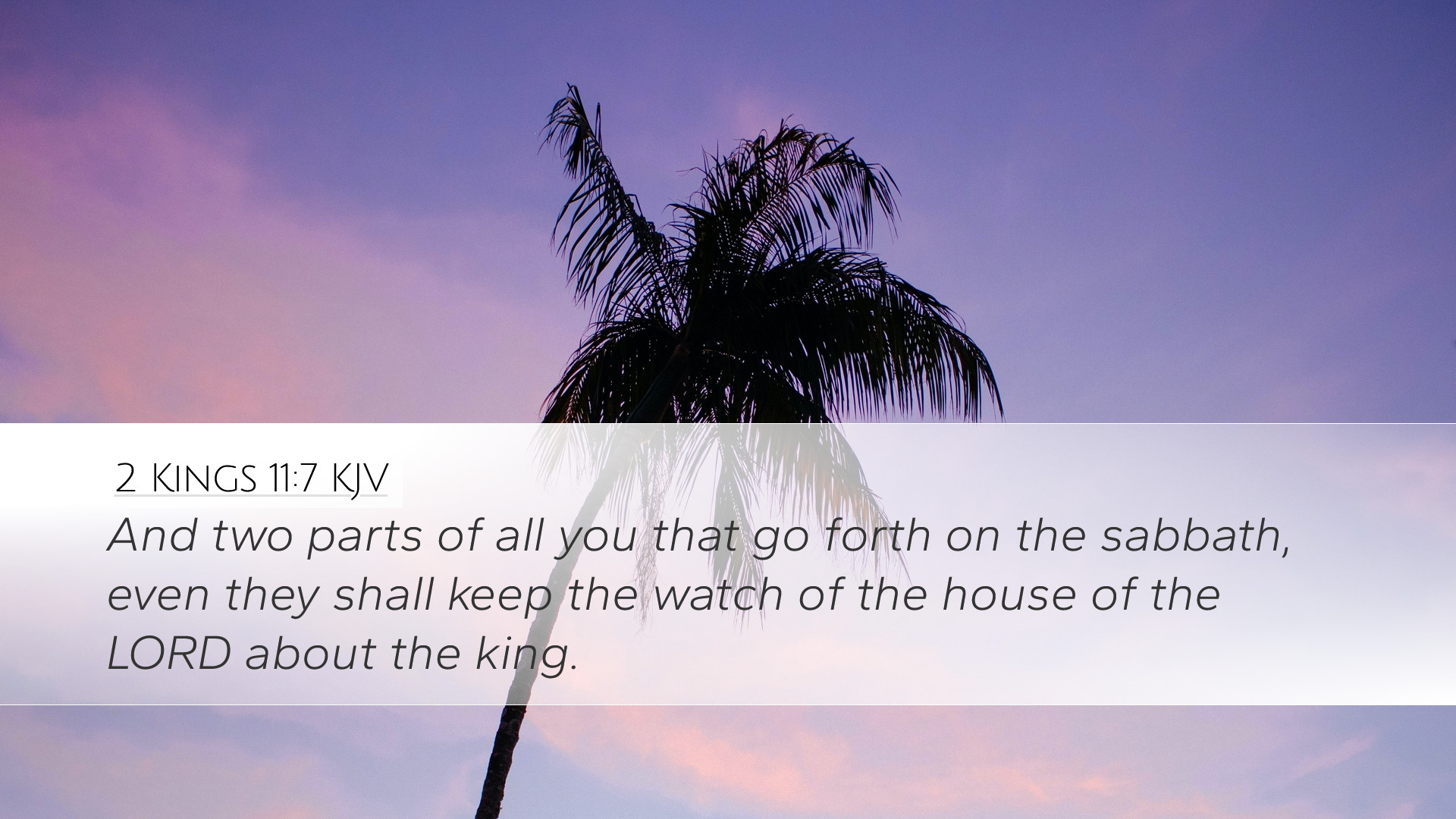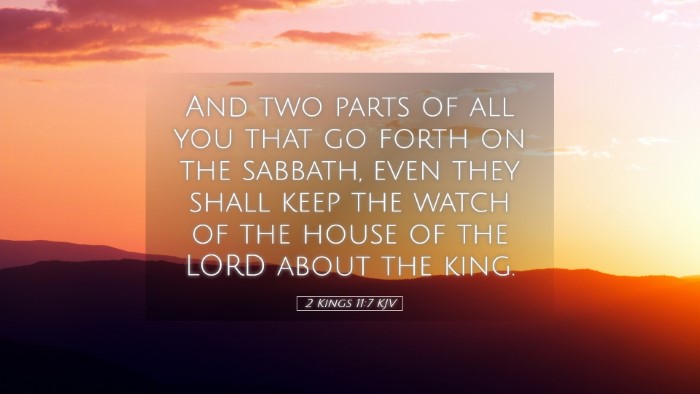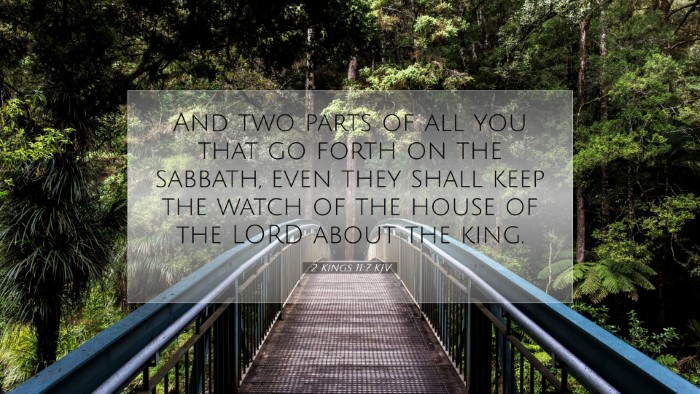Old Testament
Genesis Exodus Leviticus Numbers Deuteronomy Joshua Judges Ruth 1 Samuel 2 Samuel 1 Kings 2 Kings 1 Chronicles 2 Chronicles Ezra Nehemiah Esther Job Psalms Proverbs Ecclesiastes Song of Solomon Isaiah Jeremiah Lamentations Ezekiel Daniel Hosea Joel Amos Obadiah Jonah Micah Nahum Habakkuk Zephaniah Haggai Zechariah Malachi2 Kings 11:7
2 Kings 11:7 KJV
And two parts of all you that go forth on the sabbath, even they shall keep the watch of the house of the LORD about the king.
2 Kings 11:7 Bible Commentary
Commentary on 2 Kings 11:7
Scripture Reference: 2 Kings 11:7 - "And you shall be on the lookout for what the sons of Judah, who come into the Sabbath, and you shall take the king’s son, and you shall put a crown on him and give him the testimony; and you shall make him king and anoint him. And you shall blow the trumpet and say, ‘Long live the king!’”
Introduction
This verse is a pivotal moment in the narrative of 2 Kings, reflecting the desperate situation in which the surviving royal bloodline finds itself amidst the backdrop of Queen Athaliah’s ruthless reign. Athaliah’s usurpation of the throne exemplifies the destructive potential of unchecked power and idolatry that plagued the nation of Judah. The orchestrating of a plot to restore the rightful heir illustrates a profound theme of divine sovereignty, human agency, and the hope of renewal within God's covenant.
Historical Context
The context surrounding 2 Kings 11:7 involves Athaliah, the daughter of Ahab and Jezebel, who seized the throne of Judah after the death of her son, Ahaziah. Her reign is marked by idolatry and violence, including the massacre of the royal family to consolidate her power. However, her tyranny is challenged by the courageous stand of Jehoiada the priest, who becomes instrumental in the preservation of the Davidic line. This historical backdrop is crucial for understanding the gravity of this verse and its implications for Israel.
Thematic Analysis
- Divine Sovereignty: The mention of “the king’s son” highlights God's continuing commitment to His covenant with David. Despite human failings and the apparent dominance of evil, God preserves a remnant and fulfills His promises.
- Righteous Leadership: Jehoiada’s actions reflect the need for godly leadership. This verse underscores the importance of appointing leaders who uphold God's commandments and lead the people back to worship and righteousness.
- The Role of the Community: The instruction to the guards to be vigilant emphasizes the communal responsibility in safeguarding the covenant community. Each member has a role in promoting justice and ensuring that leadership aligns with God’s purpose.
Commentary Insights
Matthew Henry: In his perspective, Henry emphasizes the critical nature of the conspiracy hatched by Jehoiada the priest. He notes that although Athaliah believed she had eliminated all threats to her rule, God had preserved Joash, the infant heir, setting the stage for the restoration of righteousness. Henry's commentary highlights how this event demonstrates God's providential workings in protecting His promises even in dire circumstances.
Albert Barnes: Barnes focuses on the procedural aspects of the anointing and crowning of Joash, interpreting the ceremonial elements—like the presence of the testimony (likely the law or covenant)—as central to establishing legitimate kingship. He notes that the blowing of the trumpet signifies a public declaration of the new king, which serves as both a rallying cry and a reinvigoration of national identity rooted in covenant loyalty.
Adam Clarke: Clarke brings a pastoral insight into this verse by suggesting the importance of recognizing legitimate authority. He explains that the people of Judah, having lived under Athaliah's tyranny, needed a spiritual and political restoration that anointing Joash would provide. Clarke elaborates that this act symbolizes hope and the reestablishing of the Davidic lineage, rotating back to the Lord’s plan for Israel's kingship.
Theological Implications
The implications of this passage extend into discussions of messianic hope. Just as Joash is appointed to restore the kingdom, Christians interpret this as a foreshadowing of Christ, who emerges from the lineage of David, fulfilling the ultimate deliverance. The tension between the forces of evil and the hope for restoration prompts a reflection on current leadership and the role of faith communities in pursuing justice, righteousness, and divine favor.
Application for Today
Pastors and church leaders can draw several lessons from 2 Kings 11:7:
- The Importance of Vigilance: Just as the leaders were instructed to be watchful, contemporary church leaders must remain vigilant against spiritual complacency and attacks on the faith.
- Leading with Righteousness: The selection of leaders should reflect a commitment to godliness and righteousness, anchoring their decision-making in the Word of God.
- Community Responsibility: Every believer plays a vital role in promoting God's kingdom. Encouraging communal engagement in spiritual matters can strengthen the church and ready it to face challenges.
Conclusion
In summary, 2 Kings 11:7 encapsulates a moment of divine intervention and hope amid darkness. Through the lens of various commentators, this verse serves as a reminder of God’s faithfulness to His promises and the enduring nature of His covenant. It teaches Christians about the importance of righteous leadership and the communal responsibility to uphold the truth of God’s Word in every generation. Thus, it invites reflection on how believers today can actively participate in the restoration of God's kingdom here on earth.


